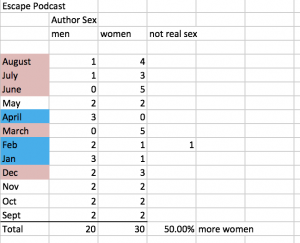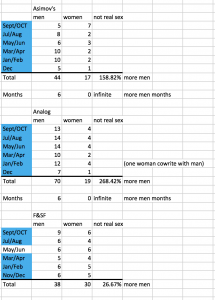NK Jemisin won another Hugo award this year — her third in a row — and she gave a powerful acceptance speech. Read the whole thing, but this was a notable piece.
But this is the year in which I get to smile at all of those naysayers—every single mediocre insecure wannabe who fixes their mouth to suggest that I do not belong on this stage, that people like me cannot possibly have earned such an honor, that when they win it it’s meritocracy but when we win it it’s “identity politics” — I get to smile at those people, and lift a massive, shining, rocket-shaped middle finger in their direction.
Exactly right. The most fervent practitioners of identity politics are the old white guys who feel their entitlements are being challenged.
Here’s another excerpt:
I have gritted my teeth while an established professional writer went on a ten-minute tirade at me—as a proxy for basically all black people—for mentioning underrepresentation in the sciences.
I’m not sure who that was, but I know there’s no shortage of racists ranting about “identity politics”, so the field is wide open on that one. I thought immediately of Vox Day, though, who called her an educated, but ignorant half-savage
and has long been whining about all the SJWs in science fiction.
So I had to go look and see how Vox Day was taking this repudiation of his position and the ongoing defeat of his slate of “puppies”. Not well, I’m afraid. He’s plumbing deep wells of dishonesty now. You see, that a group of people he detests are winning all the rewards and recognition means the he thinks he has won — after all, giving an award to a half-savage
means the Hugos have now self-destructed and there’s nothing left but a great big crater. And even better, he thinks he has nuked the Hugos for the past three years now.
It’s a thriving crater populated with new and interesting writers, but he’s not going to read any of them anyway.
But what most appalled me is that he quotes the full text of Jemisin’s speech…but removes all of the punctuation and paragraphs, and then sneers mockingly at it. The comments are full of people thinking that Jemisin is illiterate because of that intentional dishonesty, and whining about how women can’t write.
That’s the kind of poison I’d expect of a hack like Vox Day, but what really disappoints me is that he quotes Robert Silverberg.
But in her graceless and vulgar acceptance speech last night, she insisted that she had not won because of ‘identity politics,’ and proceeded to disprove her own point by rehearsing the grievances of her people and describing her latest Hugo as a middle finger aimed at all those who had created those grievances.
He says “her people” and “identity politics”, not noting his own hypocrisy, and bashes her for vulgarity.
You might want to read these reviews of Silverberg’s own book, Up the Line.
Robert Silverberg wrote this libidinous, vulgar carnival ride in 1969 and it was nominated for the Hugo Award. This represents my 25th Silverberg work reviewed and I have come to accept that his lasciviousness makes late era Heinlein look like a boy scout. There is just going to be sex in a Silverberg work, lots of it, and this one has all the sensitivity of a bawdy limerick, reminiscent of Heinlein’s Time Enough for Love and All You Zombies – readers of those books will instantly know what I’m talking about.
Robert Silverberg was clearly a big fan of sex back in the late 1960s, and I’m sure he wasn’t the only one. But in Up the Line, he absolutely revels in it. He doesn’t miss a chance for his (all male) characters to fornicate with women at every possible opportunity both in the future and the past, in dozens of exotic time periods in Byzantium, Constantinople, Rome, etc. The act may be as old as time, but that doesn’t stop Time Courier Judd Elliot from trying to bed his great-great-great grandmother Pulcharia with a lusty enthusiasm and complete disregard for all social taboos that have existed for millenia. Sure, it’s generally a serious no-no in society to screw your ancestors, but when she is as saucy a sex-kitten as Pulcharia, well who can blame Judd? At least that is the irreverent tone this book tries to achieve, billing its main character as the “Tom Jones of Time Travel”.
So when did 83-year-old Silverberg become a hypocritical prissy prude? I’ve read lots of Silverberg, and it’s absurd for him to look at Jemisin’s speech and complain about “graceless and vulgar”. He’s written much more vulgar stuff — and what’s really got him upset is that a black woman was bold and critical.








